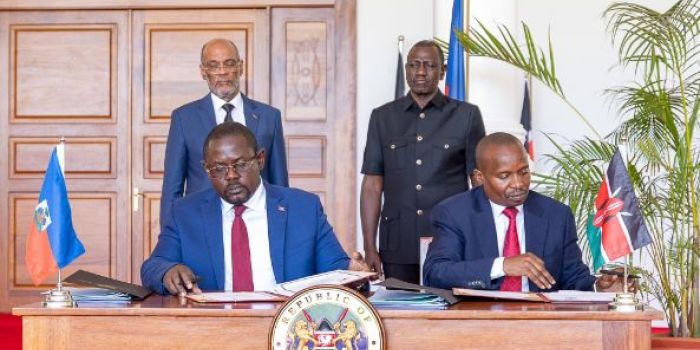Kenya and Haiti have solidified their pact for the dispatch of 1,000 police officers to the Caribbean nation.
The formal agreement, signed on Friday, March 1, at State House, saw Interior Cabinet Secretary (CS) Kithure Kindiki and Haiti's Security Minister put pen to paper.
President William Ruto and Haiti's Prime Minister Ariel Henry graced the occasion, underscoring the significance of the deal.
Despite facing legal hurdles, including a court order terming the deployment plan unconstitutional, the two nations proceeded with the arrangement.
Prime Minister Henry's visit to Kenya, following President Ruto's invitation, aimed to finalize the agreement, emphasizing cooperation amid shared historical ties.
During discussions, President Ruto pledged Kenya's support in addressing Haiti's security challenges, citing shared cultural roots.
"We are extending the experience and expertise of our police officers under the Multinational Security Support Mission in Haiti, as mandated by the United Nations Security Council and upheld by our judiciary," remarked President Ruto.
The decision to deploy officers stemmed from recent unrest in Haiti, including a coordinated attack by a criminal gang on vital infrastructure.
In a circulated video, Jimmy Cherizier, leader of the gang federation G9 Family and Allies, threatened further destabilization, prompting urgent intervention.
Despite previous legal setbacks, including a High Court ruling declaring the deployment unconstitutional, Kenya's commitment to assisting Haiti remains steadfast.
Additionally, the United States Ambassador to the United Nations, Linda Thomas-Greenfield, disclosed Benin's pledge of 2,000 troops to bolster the multinational force, indicating broader support for stabilizing Haiti's security situation.

